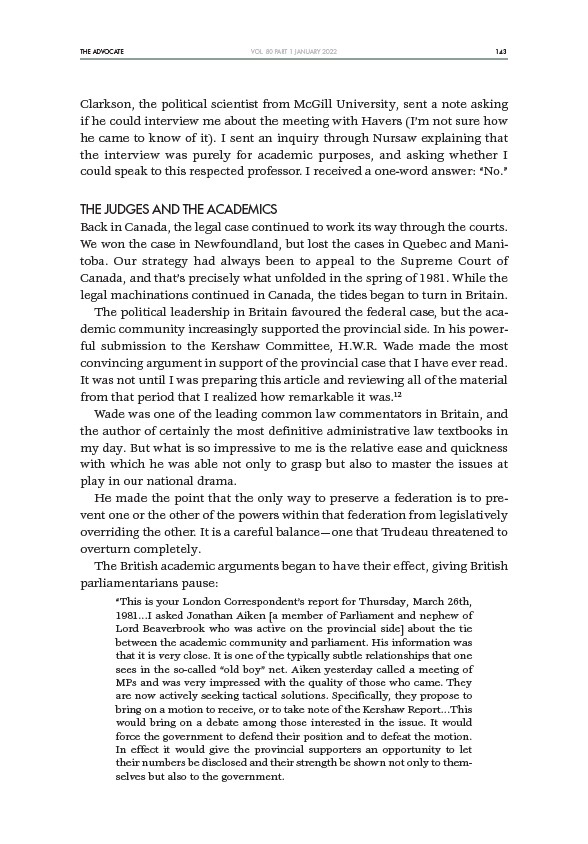
THE ADVOCATE 143
VOL. 80 PART 1 JANUARY 2022
Clarkson, the political scientist from McGill University, sent a note asking
if he could interview me about the meeting with Havers (I’m not sure how
he came to know of it). I sent an inquiry through Nursaw explaining that
the interview was purely for academic purposes, and asking whether I
could speak to this respected professor. I received a one-word answer: “No.”
THE JUDGES AND THE ACADEMICS
Back in Canada, the legal case continued to work its way through the courts.
We won the case in Newfoundland, but lost the cases in Quebec and Manitoba.
Our strategy had always been to appeal to the Supreme Court of
Canada, and that’s precisely what unfolded in the spring of 1981. While the
legal machinations continued in Canada, the tides began to turn in Britain.
The political leadership in Britain favoured the federal case, but the academic
community increasingly supported the provincial side. In his powerful
submission to the Kershaw Committee, H.W.R. Wade made the most
convincing argument in support of the provincial case that I have ever read.
It was not until I was preparing this article and reviewing all of the material
from that period that I realized how remarkable it was.12
Wade was one of the leading common law commentators in Britain, and
the author of certainly the most definitive administrative law textbooks in
my day. But what is so impressive to me is the relative ease and quickness
with which he was able not only to grasp but also to master the issues at
play in our national drama.
He made the point that the only way to preserve a federation is to prevent
one or the other of the powers within that federation from legislatively
overriding the other. It is a careful balance—one that Trudeau threatened to
overturn completely.
The British academic arguments began to have their effect, giving British
parliamentarians pause:
“This is your London Correspondent’s report for Thursday, March 26th,
1981…I asked Jonathan Aiken a member of Parliament and nephew of
Lord Beaverbrook who was active on the provincial side about the tie
between the academic community and parliament. His information was
that it is very close. It is one of the typically subtle relationships that one
sees in the so-called “old boy” net. Aiken yesterday called a meeting of
MPs and was very impressed with the quality of those who came. They
are now actively seeking tactical solutions. Specifically, they propose to
bring on a motion to receive, or to take note of the Kershaw Report…This
would bring on a debate among those interested in the issue. It would
force the government to defend their position and to defeat the motion.
In effect it would give the provincial supporters an opportunity to let
their numbers be disclosed and their strength be shown not only to themselves
but also to the government.